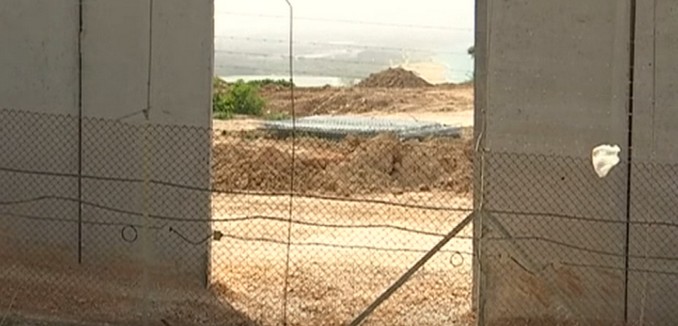Israel unveiled an 11 kilometer (7.5 miles) , 9 meter (29.5 feet) high wall that it has erected along its border with Lebanon as part of its efforts to prevent terrorist infiltrations by the Iranian-backed terrorist group, Hezbollah, from the north, The Times of Israel reported Thursday.
A senior military officer who briefed reporters added a warning to Hezbollah saying that any terrorist who infiltrated into Israel “will not come back alive.”
Israel is preparing to defend itself against a Hezbollah unit, Radwan, which was formed about seven year ago with the specific purpose of infiltrating into Israel and carrying out terror attacks there. The goal wouldn’t just be the actual destruction the unit would cause, but also the symbolism of having terrorists carry out attacks inside Israel.
Hezbollah’s chief, Sheikh Hassan Nasrallah, in May of last year, spoke of attacking Israel “within its territory.”
Another challenge facing the IDF on Israel’s northern border is differentiating between Hezbollah and members of the Lebanese Armed Forces (LAF). “We see them working together, traveling in the same jeeps,” the officer said. “Sometimes we see Hezbollah soldiers in LAF vests.”
The close cooperation between the two forces raised questions as to whether the IDF would target the LAF in any future conflict with Hezbollah. In 2006, the LAF largely did not join Hezbollah in its war against Israel. However, the senior officer said that if, in a future conflict the LAF did participate, then “it’s not a question” that Israel would target them.
The goal of the fence being built is to prevent snipers from targeting Israelis from Lebanon, as well as to prevent infiltrations. The wall is outfitted with sophisticated cameras and sensors to detect any attempts to cross the border.
The IDF did not say if this fence had a component underground to prevent subterranean infiltrations. Though there have been rumors that Hezbollah has been making attempts to tunnel under the border, the senior IDF officer dismissed those reports as “just rumors.”
Hezbollah, according to the officer, “plans to do here,” what it learned from fighting in support of Syrian dictator Bashar al-Assad in Syria. Despite this, he thought it was unlikely that Israel would face a two-front war in the north, because “the last thing Assad needs is a war,” as he seeks to rebuild his country after a seven-year civil war.
In a June 2016 essay, law professor Willy Stern explained that while Hezbollah has the manpower and weapons arsenal “of a nation-state…its tactics are those of a terrorist organization.” The destruction inflicted upon Lebanon in the event of war will therefore be massive, despite the fact that the IDF wages war in a cautious way to minimize civilian casualties. “The IDF’s warnings certainly go beyond what the law requires, but they also sometimes go beyond what would be operational good sense elsewhere,” noted Michael Schmitt, chairman of the Stockton Center for the Study of International Law at the U.S. Naval War College. “People are going to start thinking that the U.S. and other Western democracies should follow the same examples in different types of conflict. That’s a real risk.”
Israeli military officials in May 2015 told the New York Times that Hezbollah has “moved most of its military infrastructure” in and around Shiite villages, which “amounts to using the civilians as a human shield.” One senior military official added that Lebanese civilians are “living in a military compound,” noting: “We will hit Hezbollah hard, while making every effort to limit civilian casualties as much as we can…We do not intend to stand by helplessly in the face of rocket attacks.”
[Photo: Haaretz.com / YouTube ]




